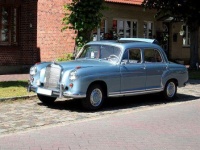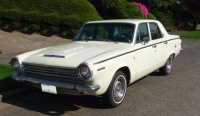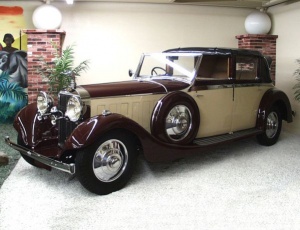Chapter 11
- Please keep these annotations SPOILER-FREE by not revealing information from later pages in the novel.
Page numbers refer to editions with 369 pages, where the story begins on page 1. Not sure if there are other editions with variant pagination. Please let us know otherwise.
Contents
Page 166
Brylcreem
Brylcreem is a hair styling oil/gel for men that was very popular. It gives hair a wet, oily look.
on the natch
"natch" is short for "natural" and "on the natch," in this context, means sober. On pg. 273, the perennially sober Bigfoot is described as a "literal-minded natch-meister."
Page 168
Leuzinger High
A real high school, in Lawndale, California, which - particularly in the story's time period - was a relatively undesirable and low-priced city in the LA area.
Dr. Blatnoyd
Probably a play on the term of Russian origin, meaning a man with underworld connections or a career criminal.
Page 170
Section Eight hippies
Section Eight is low income housing funded with a federal subsidy.
Page 171
Japonica Fenway
"Japonica" is just a Latinization of "Japanese," but it is most commonly used in formal Latin plant names. There are a wide variety of "____ Japonica" plants, such as the Camellia Japonica. While it's not really possible to make any universal statement about such widely varied species, they tend to be ornamental and hardy. See: Plants of Inherent Vice
Crocker Fenway
It is possible the first name is inspired by the character "Crocker Jarmon" from the movie The Candidate (1972). The character in the movie is an establishment, incumbent GOP Senator from California.
The first names of both characters may also refer to Crocker National Bank, which historically was a conservative, Republican institution. 1936 Time Magazine reference, 1986 Article.
the ancient American Indian belief that if you save somebody's life, you are responsible for them from then on, forever
Last seen in Against the Day with Foley Walker and Scarsdale Vibe.
Page 172
Governor Reagan
Ronald Reagan was governor of California from 1967 to 1975.
Page 175

Mercedes sedan
ten-year-old Mercedes sedan with a roof panel
Page 176
outdoor concerts where thousands . . . public self
A good description of Woodstock, which had just taken place the previous year.
each person was listening in solitude, confinement and mutual silence
Perhaps a foreshadowing of the iPod generation?
headphones!
Here, "head" refers to drugs, as in "head shop".
Page 180
Things were weird for a few days with the Dart
The timeline gets broken here. From the end of the book to this point--from April 26 to May 8--the narrator has made it easy to follow the events of the book in real time. The narrator puts Doc to bed at night, gets him up in the morning, points out television shows and events. The only break is an "another day" inserted between May 4 and May 5. That makes a total of 14 days in the second half of the book.
The first half of the book, twelve days up to the "few days" the Dart was in the shop, are much more difficult to match with real time events. For example, Doc's parents visit during a division semifinal game between the 76ers and the Bucks. That series was played from March 25 to April 3. None of the games were played on a Sunday, which would be the day of the visit, if the first day of the book is a Tuesday. It would also mean that the Dart was in the shop for a couple of weeks.
When he finally went over to pick up his ride
Probably morning, Sunday, April 26, 1970. See below for an explanation of "probably". The obvious reference is to the resurrection of Jesus Christ, who also came back on a Sunday. This is not Easter Sunday, though. It occurred on March 29 in 1970.
Page 181
'64 Dodge Dart

Page 182
I'll buy you lunch
Probably morning, Sunday, April 26, 1970. I say probably because it seems unlikely that Doc could have lunch with Tito, make a few phone calls, and drive to Ojai, getting there before lunchtime. The narrator has been pretty careful, though, from the end of the book to this point in noting the ends and beginnings of days.
They went down Pico . . . before repeating an ethnic category.
A possible nod to noted LA chowhound Johnathan Gold, who got his start as a Pulitzer Prize winning food critic eating his way across ethnic LA along Pico Blvd. Profiled here on NPR's "This American Life" (See: Act Five. Taste.)
Page 184
1934 Hispano-Suiza J12
| Chapter 1 pp. 1-18 |
Chapter 2 pp. 19-45 |
Chapter 3 pp. 46-49 |
Chapter 4 pp. 50-54 |
Chapter 5 pp. 55-67 |
| Chapter 6 pp. 68-88 |
Chapter 7 pp. 89-110 |
Chapter 8 pp. 111-123 |
Chapter 9 pp. 124-153 |
Chapter 10 pp. 154-162 |
| Chapter 11 pp. 163-185 |
Chapter 12 pp. 186-206 |
Chapter 13 pp. 207-234 |
Chapter 14 pp. 235-255 |
Chapter 15 pp. 256-274 |
| Chapter 16 pp. 275-295 |
Chapter 17 pp. 296-314 |
Chapter 18 pp. 315-342 |
Chapter 19 pp. 343-350 |
Chapter 20 pp. 351-363 |
| Chapter 21 pp. 364-369 |